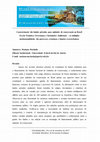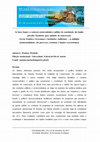Papers by Mariana Machado
Conservação Internacional -desenvolvimento em conjunto de todas as ações previstas no projeto The... more Conservação Internacional -desenvolvimento em conjunto de todas as ações previstas no projeto The Nature Conservancy -acompanhamento das ações do Programa de Incentivo às RPPNs da Mata Atlântica

The Private Reserves of Natural Heritage (RPPN, Portuguese acronym) are strategic to Atlantic For... more The Private Reserves of Natural Heritage (RPPN, Portuguese acronym) are strategic to Atlantic Forest conservation, especially in Rio de Janeiro State, were the private forest areas account for 65% of the total remaining forest. The involvement of municipalities is considered positive, by the possibility of simplify and expedite the process of recognition of private reserves. However, there is great concern about if the procedures adopted by the municipalities meet the legal criteria and procedures for establishing these reserves and not undermine their legal certainty. This paper examined legal frameworks on RPPN approved by eight municipalities under the following aspects: compliance with federal and state regulations, legal certainty, innovation on incentives to private reserves and effectiveness in the implementation of the law. We found legal non-conformities in four municipalities: Petropolis, Resende, Miguel Pereira and Rio Claro. In the legal certainty component, we found that, six municipalities standardize the procedures and the list of documents for RPPN creation. Although only four, require georeferenced maps. About incentives, seven define at least one incentive for private reserves, especially the reduction and/or exemption from urban property tax (IPTU, acronym Portuguese). However, we did not confirm the application of this benefit. Two cities established the transference of ecological ICMS resources to RPPN but only in Varre-Sai it is already a reality. Five municipalities are applying their law and have already created 15 RPPN totaling 287.60 hectares in protection. Despite the positivism in these local initiatives, we understand that the role of the municipalities should be to support the RPPN management by prioritizing incentive actions, whether financial or technical. Therefore, we consider that the main gap in federal and state public policies for private reserves is to apply at local level the mechanisms to incentive and support the RPPN and municipalities can be protagonists in these efforts.

RESUMO Este trabalho apresenta o perfil das RPPN localizadas no Planalto Paulistano. O estudo foi... more RESUMO Este trabalho apresenta o perfil das RPPN localizadas no Planalto Paulistano. O estudo foi baseado em entrevistas aos proprietários de dez reservas privadas localizadas na zona oeste da Região Metropolitana de São Paulo. A maioria das reservas foi criada com objetivos conservacionistas. Nove das reservas não possui qualquer instrumento de manejo. As principais ameaças enfrentadas pelas reservas foram: caça, incêndios, falta de recursos e apoio. O potencial das reservas na conservação da natureza poderia melhorar com a criação de uma rede de parcerias e com a formação de convênios para suprir as demandas de apoio e manejo adequado das reservas. ABSTRACT This work presents a profile of RPPN located in the São Paulo Atlantic Plateau. The study was based in interviews to the owners of ten private reserves located in the west portion of São Paulo City. Most of reserves were created for conservationist purposes. Nine of ten reserves have no management instruments. The main threats that the reserves are under were: hunt, fire, lack of resources and support. The conservation potential of the reserves could be improved with a net of partnerships and agreements to supply the needs for support and adequate management of the reserves.

RESUMO Este trabalho apresenta uma discussão sobre a eficiência das Reservas Particulares do Patr... more RESUMO Este trabalho apresenta uma discussão sobre a eficiência das Reservas Particulares do Patrimônio Natural – RPPN na conservação da natureza no Brasil, considerando seus aspectos histórico e político-institucional. A trajetória das RPPNs como instrumento jurídico de conservação da natureza revela sua consagração no cenário ambientalista brasileiro. O fortalecimento das RPPNs como ferramenta na conservação biológica depende de políticas públicas de apoio aos proprietários mais eficazes, e de um incremento aos instrumentos econômicos de incentivo à criação e gestão das reservas. Os programas de incentivo e apoio às RPPNs têm contribuído com o aumento das áreas protegidas e possibilita a melhoria nas condições de gestão das reservas, entretanto é necessário ampliar sua abrangência. A melhoria no potencial de conservação das RPPNs também depende da adoção de critérios ecológicos na instituição das reservas. ABSTRACT This wok presents a discussion about the effectiveness of Private Reserves of Natural Heritage-RPPN in nature conservation in Brazil, considering historic and politic-institutional aspects. The trajectory of RPPN as a juridical instrument of nature conservation revels their consecration on the Brazilian environmentalist scenario. The strengthened of RPPN as a tool for biological conservation depends on effective public polices for owners support and on the improvement of economic instruments for RPPN support and reserves management. The programs for RPPN support have been increasing protected area and improving management conditions, however it is necessary to enlarge the embrace. The improvement on the conservation potential of the reserves as well depends on the adoption of ecological standards for reserves institution. INTRODUÇÃO O Brasil possui a maior cobertura de florestas tropicais do mundo, aliada ao fato de sua extensão territorial e diversidade geográfica e climática, o país abriga uma imensa diversidade biológica, o que faz dele o principal entre os países detentores de mega diversidade do planeta, possuindo entre 15% e 20% das 1,5 milhões de espécies descritas na Terra (MMA, 2002).
Books by Mariana Machado
Conference Presentations by Mariana Machado

Apesar das recentes iniciativas privadas de constituição de fundos ambientais para o financiamen... more Apesar das recentes iniciativas privadas de constituição de fundos ambientais para o financiamento do Sistema Nacional de Unidades de Conservação, o conhecimento sobre o tema ainda é incipiente. Este artigo objetivou caracterizar de forma sistemática os fundos privados para unidades de conservação no Brasil quanto aos aspectos chave de sua constituição e funcionamento: agenda de financiamento, estrutura jurídica, estrutura financeira, estrutura de governança e processos de controle. As informações sobre os nove fundos privados analisados foram extraídas de artigos, documentos e relatórios de atividades, além de consulta por correio eletrônico. Ao todo, os fundos mobilizaram 262 milhões para apoiar mais de 160 unidades de conservação na Amazônia e Mata Atlântica. Observou-se uma diversidade de estruturas institucionais e arranjos inovadores para captar recursos junto ao setor privado e agências internacionais, além de alavancagem do investimento público. Os órgãos gestores das unidades apoiadas tem participação ativa nos fundos analisados. Verificou-se ainda a necessidade de melhoria nos processos de transparência e controle. A sistematização de informações básicas sobre a gestão dos fundos constitui subsídios para outras pesquisas que aprofundem o conhecimento sobre a gestão dos fundos e sua relação com as estratégias de financiamento público para as unidades de conservação.

The Brazilian financing policy for Protected Areas National System incorporated the private envir... more The Brazilian financing policy for Protected Areas National System incorporated the private environmental funds. However, there is still lack of knowledge about this strategy. This article aimed to identify the socioeconomic and political context that led to the constitution of private funds for protected areas in Brazil. It analyzed the legal frameworks, and the political and socioeconomic conditions along the trajectory of the Brazilian protected areas public policy. It was possible to identify some factors that provided a favorable scenario for the creation of these funds: restrictions in the public budget; establishment of conservation programs with international cooperation agencies and civil society organizations; difficulties of the public agencies in managing conservation programs; guidelines of international cooperation agencies to foster private funds; and legal framework for the constitution of private financial mechanisms as part of a sustainable financing strategy for protected areas. These results contribute to understand the creation and the operation of Brazilian protected areas funds and how they can be part of a complete and diversified financing plan for Protected Areas National System.
Thesis Chapters by Mariana Machado

Tese de Doutorado, 2020
This thesis investigated the institutional arrangements of private environmental funds to support... more This thesis investigated the institutional arrangements of private environmental funds to support protected areas (APs) in Brazil as public-private partnerships for financing the National System of Protected Areas (SNUC – Portuguese abbreviation), and how they adhere to the principles of public governance. The methodology adopted for the research was qualitative and included bibliographic and documentary reviews, and the analysis of three case studies: the Costa dos Corais Environmental Protection Area Fund (FAPACC), the Atlantic Forest Fund of Rio de Janeiro (FMA/RJ) and the Transition Fund of the Amazon Protected Areas Program (FT/ARPA). For this purpose, the institutional environment in which these public-private partnerships for financing the APs operate was analyzed, and the institutional arrangements of private funds to support the APs were examined, considering the decision-making processes within the partnership and how these aspects reflect in the public character of their governance. The results of the research reveal that the regulatory framework of AP policy presented important advances in systematizing procedures and guidelines for creating and managing APs, in establishing new sources and financing mechanisms, and in the governance of the APs, with greater participation by society, including resource mobilization and management. However, these advances have not been reflected in the improvement of the financial sustainability of the SNUC. The public budget allocated to the APs has been reducing and is focused on compulsory personnel expenses and social charges. Another aspect observed was that external resources are important for investments that increase the implementation of the APs, such as the elaboration of a management plan and equipment acquisition. The underfunding of the SNUC tends to severe by the budgetary restrictions imposed by Constitutional Amendment no. 95/2016, which puts pressure on the environmental agencies to seek resources through public-private partnerships. The analysis of case studies of the funds revealed that environmental funds have supported the APs not only with monetary contributions but also by developing tools and methodologies that improve their management, as well as by strengthening social participation and political support to the APs. It was possible to conclude that the governance arrangements of the funds to support the APs present different balance sheets in the distribution of discretion between public and private partners. The source of resources operated and the insertion of the partnership in public policy or program were the factors that best explained these differences. The different types of governance arrangements could be associated with different standards of accountability and transparency practices. It was found that in the partnerships where there is a balanced distribution of discretion between public and private actors, accountability and transparency are more aligned with public governance practices and principles.
Uploads
Papers by Mariana Machado
Books by Mariana Machado
Conference Presentations by Mariana Machado
Thesis Chapters by Mariana Machado